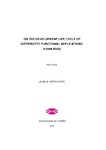On the development life cycle of distributed functional applications: a case study

View/
Use this link to cite
http://hdl.handle.net/2183/7329Collections
- Teses de doutoramento [2232]
Metadata
Show full item recordTitle
On the development life cycle of distributed functional applications: a case studyAuthor(s)
Directors
Gulías, Víctor M.Date
2010Center/Dept./Entity
Universidade da CoruñaAbstract
[Abstract] In a world where technology plays a major, increasing role day after day,
efforts devoted to develop better software are never too much. Both industry
and academia are well aware of this, and keep on working to face the new
problems and challenges that arise, more efficiently and effectively each time.
Companies show their interest in cutting-edge methods, techniques, and tools,
especially when they are backed up with empirical results that show practical
benefits. On the other hand, academia is more than ever aware of real-world
problems, and it is succeeding in connecting its research efforts to actual case
studies.
This thesis follows the mentioned trend, as it presents a study on software
applications development based on a real case. As its main novelty and contribution,
the integral process of software development is addressed from the
functional paradigm point of view. In contrast with the traditional imperative
paradigm, the functional paradigm represents not only a different way of developing
applications, but also a distinct manner of thinking about software
itself. This work goes through the characteristics and properties that functional
technology gives to both software and its development process, from
the early analysis and design development phases, up to the final and no less
critical verification and validation stages. In particular, the strengths and opportunities
that emerge in the broad field of testing, thanks to the use of the
functional paradigm, are explored in depth.
From the analysis of this process being put into practise in a real software
development experience, we draw conclusions about the convenience of applying
a functional approach to complex domains. At the same time, we extract
a reusable engineering methodology to do so.
Keywords
Programación funcional
Rights
Os titulares dos dereitos de propiedade intelectual autorizan a visualización do contido desta tese a través de Internet, así como a súa reproducción, gravación en soporte informático ou impresión para o seu uso privado e/ou con fins de estudo e de investigación. En nengún caso se permite o uso lucrativo deste documento. Estos dereitos afectan tanto ó resumo da tese como o seu contido Los titulares de los derechos de propiedad intelectual autorizan la visualización del contenido de esta tesis a través de Internet, así como su repoducción, grabación en soporte informático o impresión para su uso privado o con fines de investigación. En ningún caso se permite el uso lucrativo de este documento. Estos derechos afectan tanto al resumen de la tesis como a su contenido
ISBN
978-84-693-8373-5





